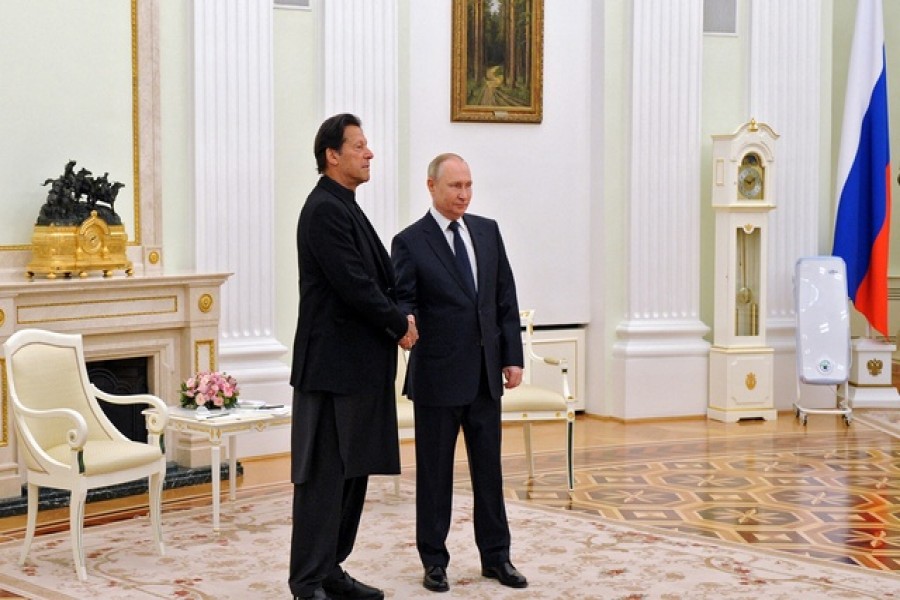Pakistan Prime Minister Imran Khan has met Russian President Vladimir Putin in Moscow as Russia launched an invasion of Ukraine, bdnews24.com reports with details from Reuters.
The meeting to discuss issues including economic cooperation took place on Thursday, a day after Khan landed in Moscow amid a crisis at the Ukraine-Russia border.
Russia mounted a mass assault by land, sea and air on Thursday morning in the biggest attack on a European state since World War Two.
Khan shook hands with Putin and sat beside the Russian president with a small table between them, photos released by the Kremlin showed.
But in a meeting with his French counterpart Emmanuel Macron days ago during the diplomatic efforts to stop the Russian president from attacking Ukraine, Putin had used a very long table that drew world attention.
The table was again on display when Putin met German Chancellor Olaf Scholz.
The 20-foot-long table Putin has used to socially distance himself this month from European leaders flying in for crisis talks symbolises, to some longtime observers, his detachment from the rest of the world.
For almost two years, Putin has ensconced himself in a virus-free cocoon unlike that of any Western leader, with state television showing him holding most key meetings by teleconference alone in a room and keeping even his own ministers at a distance on the rare occasions that he summons them in person.
Now the atmosphere of his meeting with Khan may indicate that Putin is seeking support amid the war.
The Pakistan prime minister’s two-day Moscow visit aims to push for the construction of a long-delayed, multi-billion-dollar gas pipeline to be built in collaboration with Russian companies, officials said.
The 1,100 km (683 mile)-long pipeline, also known as the North-South gas pipeline, was initially agreed to in 2015 and was to be financed by both Moscow and Islamabad, using a Russian company to construct it.
In an interview ahead of his trip, Khan had expressed concern about the situation in Ukraine and the possibility of new sanctions and their effect on Islamabad's budding cooperation with Moscow.
It is unclear how the latest sanctions will affect the project, which would deliver imported Liquified Natural Gas (LNG) from Karachi on the Arabian Sea coast to power plants in the northeastern province of Punjab.
The project is important for Pakistan - particularly the power sector - as the country's dependence on imported LNG grows in the face of dwindling indigenous gas supplies.
The pipeline project has already suffered delays because of earlier sanctions.
"This North-South pipeline suffered, one of the reasons...was the companies we were negotiating with, turned out that US had applied sanctions on them," Khan told Russia Today on Tuesday.
"So, the problem was to get a company that wasn’t sanctioned," he said of the project.


